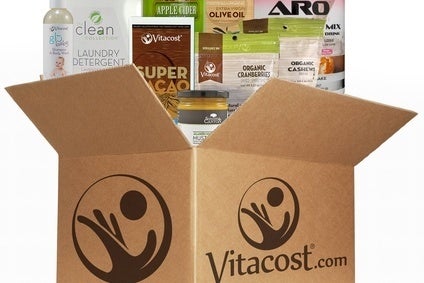US retail giant Kroger, one of the largest traditional supermarket chains in the country, today (2 July) announced a deal that showed it has recognised two key macro trends in the grocery sector – and wants a piece of the action.
Kroger has swooped to buy Vitacost, an online retailer of health products – from vitamins and beauty lines to natural and organic food.
Vitacost announced in February it had hired banking advisers to look at its “strategic alternatives” – including a sale of the business. And Kroger has pounced, agreeing to pay US$280m for a business present in all 50 states, including 16 not served by its own supermarkets.
Online grocery remains a fledgling channel in the US, with consumers in Europe more readily taken to ordering food online. Some traditional grocers have dabbled in the space – notably Safeway – but industry watchers have remarked on how conservative Kroger has been.
Kroger’s King Soopers chain offers home delivery in Denver, while the retailer’s purchase of regional grocer Harris Teeter saw it acquire a business that runs a click-and-collect service at over 150 stores.
Nevertheless, the online channel is expected to slowly gain a stronger foothold in the US and industry players are watching Amazon’s move into the grocery space with Amazon Fresh very closely. And Vitacost’s e-commerce platform gives Kroger the potential to offer home delivery of online orders across the US.

US Tariffs are shifting - will you react or anticipate?
Don’t let policy changes catch you off guard. Stay proactive with real-time data and expert analysis.
By GlobalData“This type of acquisition indicates Kroger is seeing an appetite for its customers to use an online offering,” William Blair analyst Mark Miller wrote in a note to investors today. “The timing of the acquisition is interesting, as we understand Amazon is planning to launch its fresh offering in the New York City, Philadelphia, and Boston markets in the coming months.”
Of course, one should not assume online grocery is about to rocket in the US but the deal indicates the retailer wants to have a presence in a channel that is expected to grow – even if forecasts differ to the rate of that growth.
Secondly, the acquisition will see Kroger attain a brand that has gained recognition among US consumers interested in diet and health. Vitacost’s website offers products across the health space: vitamins, supplements and beauty, as well as a range of food and beverage products in areas such as natural, organic, vegetarian and the on-trend gluten free. And these are categories that, in the main, can command higher prices than conventional products.
Kroger already claims to have a “fast-growing” natural foods business and it has its Simple Truth organic private brand. However, Vitacost sells over 45,000 products on its website, giving Kroger a greater presence in what are growing sectors.
“This merger is in line with our growth strategy to enter new markets and new channels,” Kroger CEO Rodney McMullen said today.
Shares in Kroger were up only 0.14% at 12:50 ET today, perhaps suggesting a muted investor reaction to the deal.
Vitacost made a net loss of US$14.6m in its last financial year (on sales of just short of $390m) but the deal was welcomed by Wall Street. “We view Vitacost.com as a low-risk enhancement to Kroger’s evolving omnichannel strategies across food and drug merchandising,” BB&T Capital Markets analyst Andrew Wolf said.
Moreover, it speaks to the importance of the interest more traditional players are taking in two areas of US consumer goods – online and health.





